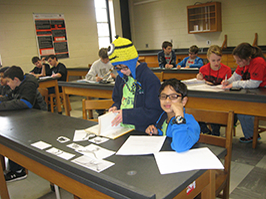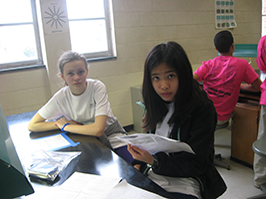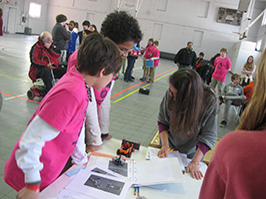South Carolina Science Olympiad
The Science Olympiad offers interscholastic academic competition in biology, earth science, chemistry, physics, problem solving, and technology. The state and national tournaments consist of a series of individual and team events, and there is a balance between events requiring knowledge of scientific facts, concepts, processes, skills, and science applications.
Any South Carolina middle school or high school is invited to enter a team in the state competition, hosted each year by Newberry College. The winning schools from each division go on to compete in the National Science Olympiad competition.
Grades 6-9
The 2016 South Carolina Division B state competition will be held at Newberry College on SATURDAY, JANUARY 30, 2016.
Make plans now to attend! Start by registering a team.
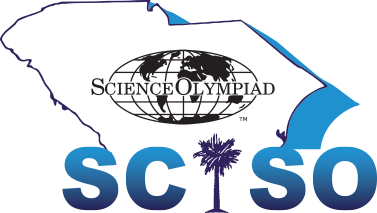
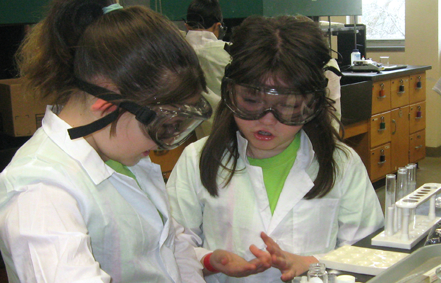
Organizing a Team
A Science Olympiad team is composed of up to fifteen students for Divisions B and C. The rules for each event should be read thoroughly by the coach before choosing the team and again by each member of the team to be certain that everyone has the same understanding of the rules. Read More
Getting Help
Running a Science Olympiad or coaching a Science Olympiad team requires people and resources. Recruit help from everywhere. In the past, teams and events have had sponsorship from local service clubs, parents' groups, school boards, intermediate (regional) school districts, senior citizens groups, flower sales, bagel sales, bake sales, book publishers, the military, science supply houses, local community colleges and newspapers. You could also try fast food chains, local congressmen, garden clubs, conservation groups, professional associations, anyone! Many businesses require about six weeks for contributions to go through their machinery, so allow enough lead-time.
Seek help with judging, organizing, and publicity from your community. This is good public relations for the school and a good way for you and your students to meet interesting people. You may even find, as several schools have, someone who will prepare students for an event. Encourage those who volunteer to wear something identifying them with the group they represent. All event supervisors, however, should wear a common Science Olympiad Officials' T-shirt, hat or name badge. Be sure to thank all those who help both publicly (perhaps with a resolution from the Board of Education) and personally in writing. Also, ask if letters may be sent to superiors.
Scheduling
There are several ways to schedule the Olympiad events. Each tournament director is free to choose the scheduling method best suited for their needs. Coaches who are on the planning committee should have input as to the "best" alternatives. Some events require specific times for each team to compete. Other events are scheduled within certain more flexible time periods. It is in the scheduling of these other events that we offer the following suggestions:
- If judges are available, events may be scheduled in some open manner, which means the competition can run all morning, all afternoon or all day. A team may enter any time that is convenient to them (e.g., Aeronautics, Bottle Rocket or Tower Building)
- Events may be scheduled for several specific time blocks and the contestants may enter on a first-come, first-serve basis. Some teams, if they are not careful, will not be able to compete if they saved that event for last and were shut out because of space limitations.
- Some events are scheduled within one limited time block and schools are scheduled to participate alphabetically or numerically during that designated time.
- Some events may be scheduled so all teams must compete at once. For example, Periodic Table is scheduled for a specific time block during which all teams compete against each other.
Pre-Science Olympiad
Many schools have had pep rallies to send off their Science Olympiad teams. They have team hats, warm-ups, flags, banners and cheers. Some teams have had a parade and police escort out of town on their way to the National Science Olympiad Tournament. Local papers have run articles on preparation for events. You may be able to get a "good luck" letter from a mayor, city council, local congressman or other local celebrity. Be sure to get publicity from your local school district's newsletter and town newspaper. You may wish to develop a Power Point or a DVD/Video presentation on your participation in the Science Olympiad. Start with the work done in getting ready and the relationship of Science Olympiad events to your District’s or State’s Science Education Standards.
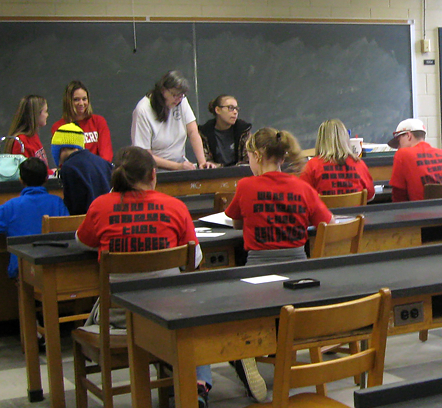
Curriculum
In addition to the need to publicize and recognize our young people, there is also a need to take a longer look at our curriculum guides in science and our daily lesson plans. Have we really included process skills in a meaningful way in our courses? Do we have students complete work in a laboratory situation weekly? Do we perform demonstrations to illustrate the concepts and facts that we want our students to understand? A student cannot become proficient in the manipulation and use of laboratory equipment overnight. A planned sequence of experiences throughout their school experience would allow the students to feel confident as they attempt to meet the challenges of the Science Olympiad's laboratory competitions. The same would be true for construction projects. Students need to be assigned low risk, high interest, well-defined, designed for-success projects. Once they reach success in these simpler projects, something more complex will not unnerve them. Finally, look at each of our science classes. Could we make them a little more interesting by using interesting Science Olympiad learning techniques? Occasionally, we could introduce or review a concept or chapter by doing Write It-Do It, Science Word, Experimental Design, etc. Teaching is hard work, but Science Olympiad can make it fun and exciting as well as challenging!
Post-Science Olympiad
After a local, state or the national finals of the Science Olympiad, do not forget to celebrate your success. At the very least, recognize the members of the team. Have their participation announced in an article of the school newspaper and have their names and events read over the school's intercom. Submit a short article in the local newspaper. Call local radio stations, including popular teen music stations. Arrange to have the youngsters accept their "Certificate of Outstanding Performance" at a school assembly or a "Breakfast with Champions". Then collect the certificates from the youngsters and make arrangements to have the local Board of Education award these certificates again at a regular meeting. The press is usually present at official school board meetings. Consider asking students to display or demonstrate their event or devices. If any of the students or team won a medal or trophy, collect them after a few days and develop a display for the principal's office or science display case. Include pictures of the students accepting the award. If none are available, have the school photographer take pictures for inclusion in the display. Make certain that the team's picture is given to the yearbook editor for inclusion as an important student activity. Again, see to it that those students who placed in an event receive appropriate recognition. Have the principal, at a school assembly, place the medal around their neck as was done at the Science Olympiad awards assembly/banquet. Be sure to also recognize parents and organizations that helped sponsor your team. Nothing succeeds like success! Recognize and celebrate the accomplishments of your talented students. The positive public relations that can be generated from this academic competition should be maximized. Use your imagination!
Grades 9-12
The 2016 South Carolina Division B state competition will be held at Newberry College on SATURDAY, JANUARY 30, 2016.
Make plans now to attend! Start by registering a team.


Organizing a Team
A Science Olympiad team is composed of up to fifteen students for Divisions B and C. The rules for each event should be read thoroughly by the coach before choosing the team and again by each member of the team to be certain that everyone has the same understanding of the rules. Read More
Getting Help
Running a Science Olympiad or coaching a Science Olympiad team requires people and resources. Recruit help from everywhere. In the past, teams and events have had sponsorship from local service clubs, parents' groups, school boards, intermediate (regional) school districts, senior citizens groups, flower sales, bagel sales, bake sales, book publishers, the military, science supply houses, local community colleges and newspapers. You could also try fast food chains, local congressmen, garden clubs, conservation groups, professional associations, anyone! Many businesses require about six weeks for contributions to go through their machinery, so allow enough lead-time.
Seek help with judging, organizing, and publicity from your community. This is good public relations for the school and a good way for you and your students to meet interesting people. You may even find, as several schools have, someone who will prepare students for an event. Encourage those who volunteer to wear something identifying them with the group they represent. All event supervisors, however, should wear a common Science Olympiad Officials' T-shirt, hat or name badge. Be sure to thank all those who help both publicly (perhaps with a resolution from the Board of Education) and personally in writing. Also, ask if letters may be sent to superiors.
Scheduling
There are several ways to schedule the Olympiad events. Each tournament director is free to choose the scheduling method best suited for their needs. Coaches who are on the planning committee should have input as to the "best" alternatives. Some events require specific times for each team to compete. Other events are scheduled within certain more flexible time periods. It is in the scheduling of these other events that we offer the following suggestions:
- If judges are available, events may be scheduled in some open manner, which means the competition can run all morning, all afternoon or all day. A team may enter any time that is convenient to them (e.g., Aeronautics, Bottle Rocket or Tower Building)
- Events may be scheduled for several specific time blocks and the contestants may enter on a first-come, first-serve basis. Some teams, if they are not careful, will not be able to compete if they saved that event for last and were shut out because of space limitations.
- Some events are scheduled within one limited time block and schools are scheduled to participate alphabetically or numerically during that designated time.
- Some events may be scheduled so all teams must compete at once. For example, Periodic Table is scheduled for a specific time block during which all teams compete against each other.
Pre-Science Olympiad
Many schools have had pep rallies to send off their Science Olympiad teams. They have team hats, warm-ups, flags, banners and cheers. Some teams have had a parade and police escort out of town on their way to the National Science Olympiad Tournament. Local papers have run articles on preparation for events. You may be able to get a "good luck" letter from a mayor, city council, local congressman or other local celebrity. Be sure to get publicity from your local school district's newsletter and town newspaper. You may wish to develop a Power Point or a DVD/Video presentation on your participation in the Science Olympiad. Start with the work done in getting ready and the relationship of Science Olympiad events to your District’s or State’s Science Education Standards.
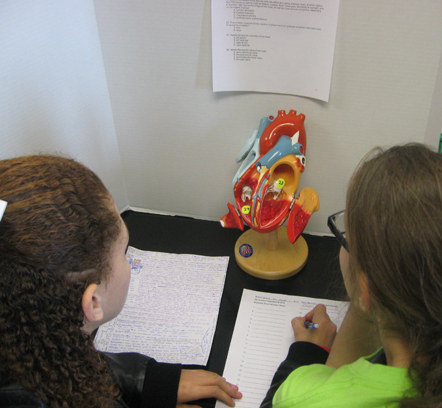
Curriculum
In addition to the need to publicize and recognize our young people, there is also a need to take a longer look at our curriculum guides in science and our daily lesson plans. Have we really included process skills in a meaningful way in our courses? Do we have students complete work in a laboratory situation weekly? Do we perform demonstrations to illustrate the concepts and facts that we want our students to understand? A student cannot become proficient in the manipulation and use of laboratory equipment overnight. A planned sequence of experiences throughout their school experience would allow the students to feel confident as they attempt to meet the challenges of the Science Olympiad's laboratory competitions. The same would be true for construction projects. Students need to be assigned low risk, high interest, well-defined, designed for-success projects. Once they reach success in these simpler projects, something more complex will not unnerve them. Finally, look at each of our science classes. Could we make them a little more interesting by using interesting Science Olympiad learning techniques? Occasionally, we could introduce or review a concept or chapter by doing Write It-Do It, Science Word, Experimental Design, etc. Teaching is hard work, but Science Olympiad can make it fun and exciting as well as challenging!
Post-Science Olympiad
After a local, state or the national finals of the Science Olympiad, do not forget to celebrate your success. At the very least, recognize the members of the team. Have their participation announced in an article of the school newspaper and have their names and events read over the school's intercom. Submit a short article in the local newspaper. Call local radio stations, including popular teen music stations. Arrange to have the youngsters accept their "Certificate of Outstanding Performance" at a school assembly or a "Breakfast with Champions". Then collect the certificates from the youngsters and make arrangements to have the local Board of Education award these certificates again at a regular meeting. The press is usually present at official school board meetings. Consider asking students to display or demonstrate their event or devices. If any of the students or team won a medal or trophy, collect them after a few days and develop a display for the principal's office or science display case. Include pictures of the students accepting the award. If none are available, have the school photographer take pictures for inclusion in the display. Make certain that the team's picture is given to the yearbook editor for inclusion as an important student activity. Again, see to it that those students who placed in an event receive appropriate recognition. Have the principal, at a school assembly, place the medal around their neck as was done at the Science Olympiad awards assembly/banquet. Be sure to also recognize parents and organizations that helped sponsor your team. Nothing succeeds like success! Recognize and celebrate the accomplishments of your talented students. The positive public relations that can be generated from this academic competition should be maximized. Use your imagination!
The Nation’s Most Exciting K-12 Science Competition
What began 32 years ago as a grassroots assembly of science teachers is now one of the premier science competitions in the nation, providing rigorous, standards-based challenges to more than 7,300 teams in 50 states.


About Science Olympiad
Science Olympiad comes in many shapes and sizes to fit your needs. At the K-6 level, try an Elementary Science Olympiad (ESO) program, which can come in the form of a competitive tournament, a hands-on science Fun Day or an expert-filled Science Olympiad Fun Night. In grades 6-12, Science Olympiad functions much like a football or soccer team, requiring preparation, commitment, coaching and practice throughout the year. Read More
Mission
The Herman Langford Communications Center, completed in 1990, has state-of-the-art communications facilities
including a TV studio, radio station, and suites for audio and video production.The McClurg Center, along with the
nearby Science and Mathematics Building, houses classrooms, seminar rooms, science and computer laboratories, art studios, and offices.
Wessels Library houses a comprehensive collection of books, periodicals, and non-print materials. Through its Inter-Library
arrangements, students have access to research materials throughout the nation. In the Special Collections room are many historical
documents relating to Lutheranism and to the local area as well as a special facsimile of the Book of Kells.
Background
We would be delighted to have you start a Science Olympiad team in your school to share the excitement and successes that have been experienced at Science Olympiad Tournaments all across the country. You will be joining more than 16,000 K-12 schools that participated in last year's Science Olympiad Tournaments.
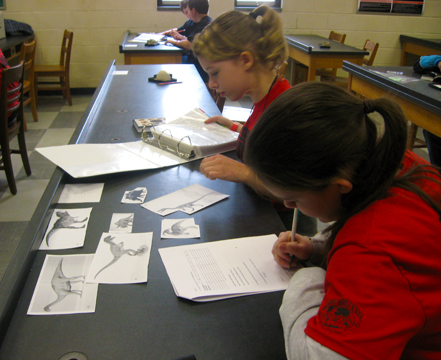
History
Science Olympiad began when Dr. Gerard J. Putz, Regional Science Consultant for Macomb County Intermediate School District in Michigan, invited John C. "Jack" Cairns, State Science Supervisor for Delaware Department of Instruction, to share the Science Olympiad program with Macomb County educators on March 29, 1982. The invitation was prompted by an article on the Delaware Science Olympiad (The Science Teacher, December 1977) written by Douglas Macbeth, past Delaware State Science Supervisor, that was brought to Dr. Putz's attention by Michigan Science Teachers Association President David Larwa. The Delaware Science Olympiad was patterned after similar events in Pennsylvania and North Carolina. After two successful workshops at the Macomb Intermediate School District (March 1982) and the Edsel and Eleanor Ford Estate (January 1983), science education leaders in Southeastern Michigan planned two very successful tournaments at Lawrence Institute of Technology (April 1983) and Oakland University (May 1984). These two tournaments were so successful that Dr. Putz convinced Mr. Cairns that they should share the program with the rest of the nation. The Science Olympiad program was presented to the Council of State Science Supervisors at the National Science Teachers Association (NSTA) Conference in Boston in 1984 and sponsors were solicited from the conference exhibitors. Dr. Putz's experience with the Army (Lt. Col. Air Defense Artillery, retired) and the understanding of its continued need for a high-tech modern work force led him to the Army's booth. After much discussion, the Army decided to sponsor a National Leadership Seminar to determine the level of interest before they committed to sponsoring the first Science Olympiad National Tournament. Leaders from all 50 states and Puerto Rico were invited to this first seminar at the St. Clair Inn in Michigan in the summer of 1984. Event supervisors, coaches and students so impressed the United States Army Recruiting Command (USAREC) executives and the N.W. Ayer advertising agency that the Army decided to sponsor Science Olympiad's national founding. The first annual Science Olympiad National Tournament was hosted by Michigan State University in May, 1985, with 17 states participating. Currently, there are nearly 7,000 secondary schools from 50 states participating, with an additional 10,000 or more elementary schools holding Science Olympiad tournaments or hands-on events.


